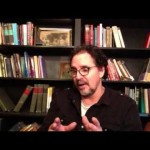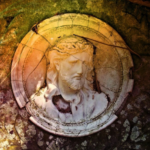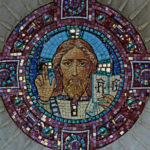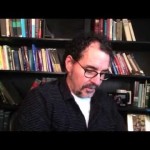We run our website the way we wished the whole internet worked: we provide high quality original content with no ads. We are funded solely by your direct support. Please consider supporting this project.

Reflections on the Supremacy of Christ (Part 2)
Whereas most Christians place the revelation of God in Christ alongside of other portraits of God and end up with an amalgamated image of God, we at ReKnew encourage believers to base their understanding of God completely on Christ, and especially on Christ crucified. And we encourage disciples to work to reinterpret through the lens of the cross every image of God in Scripture that conflicts with it. This is what I am seeking to accomplish in my forthcoming book, The Crucifixion of the Warrior God: Reinterpreting the Old Testament’s Violent Divine Portraits in Light of the Cross (IVP). (By the way, I am aiming at completing this work by the end of this year, which would probably mean that it would be published late 2013 or early 2014.)
I find myself in agreement with Dieter Georgi when he notes that the revelation of God on the cross was for Paul and the communities he pastored “more than a shift in their understanding of themselves and of God.” With this revelation, “[t]he very essence of the matter is changed: it is God who has been transformed.”[1] In fact, in relation to what was revealed about God in the Old Testament, Georgi goes so far as to contend that the revelation of God in the crucified Christ “stands God on the head.”[2]
My claim is that the New Testament itself sets the precedent for placing the revelation of God in the crucified Christ over, instead of alongside of, other images of God in Scripture. I shared the first Reflection of the Supremacy of Christ in my previous post. I will now share a second.
The author of Hebrews opens the Epistle by saying:
In the past, God spoke to our ancestors through the prophets at many times and in various ways. But in these last days he has spoken to us by his Son….The Son is the radiance of God’s glory and the exact representation of his being…(Heb 1:1-3).
While this author acknowledges that God spoke in a variety of ways in the past, he also emphasizes that the revelation of God in Jesus supersedes these past revelations. Unlike past revelations that were mediated through prophets, Jesus is God’s own Son. The author is essentially saying that the revelation of God in his Son contrasts with the “various ways” God was revealed in the past because in the Son we finally have God in person.
So too, while Old Testament writings may reflect aspects of God’s glory, this author says that the Son alone reflects the “radiance of God’s glory.” To grasp his point, we could say that “radiance” (apaugasma) is to “glory” (doxa) what light is to the sun. When God’s glory is manifested, the author is saying, it looks like Jesus. Every previous reflection of God’s glory, by contrast, was a mere approximation.
Along the same lines, while Old Testament writings may capture glimpses of what God is like, the author of Hebrews proclaims that the Son alone is God’s exact representation. The Greek word translated “representation” (characktēr) refers to a stamp, carving or image. The author is thus saying that in the Son alone we discover exactly what God is like. Paul’s teaching that Jesus is the one true image (iconos) of God says the same thing (2 Cor 4:4).
And, most importantly, this “representation” reveals exactly what God is like in his very “being.” The Greek word translated “being” (hypostasis) refers to the essence or substance of something. This author is thus teaching us that, while previous revelations may reflect approximations of God’s attributes or of what God is like in his activity, the Son alone reveals exactly what God is like in his very essence, in his innermost heart, or in his eternal nature. The Son thus sums up, and supersedes, all that was true about previous revelations.
Whatever you make of the sometimes horrifically violent portraits of God in the Old Testament, I strongly encourage you to not fuse these with what you learn about God’s character in Christ. Fix your eyes on Jesus, as this author says (Heb 12:2). Trust that the perfect, other-oriented, self-sacrificial love that is revealed on Calvary displays the full beauty of exactly what God is like to the very core of his being.
[1] D. Georgi, Theocracy in Paul’s Praxis and Theology (Minneapolis: Fortress, 1991), 20.
[2] Georgi, ibid., 54.
Image by D. Sharon Pruitt. Sourced via Flickr.
Category: General
Tags: Bible, Cruciform Theology, Jesus, ReKnew
Related Reading

God’s Aikido Way of Defeating Evil
Greg continues his thoughts on the atonement with this installment highlighting the way God uses the evil intentions and actions of his enemies to bring about good. And because this strategy is based in love, the demons who encountered Christ could not possibly imagine what he was up to. They ended up participating in their…

Overemphasizing Christ?
In response to my work, some have argued that I tend to overemphasize Christ. In light of the claim that in Jesus we have the one and only definitive Word of God and that no previous revelation should ever be placed alongside him or allowed to qualify what he reveals about God, some allege that…

Jesus, the Word of God
“[T]he standing message of the Fathers to the Church Universal,” writes Georges Florovsky, was that “Christ Jesus is the Alpha and Omega of the Scriptures both the climax and the knot of the Bible.”[1] It was also unquestionably one of the most foundational theological assumptions of Luther and Calvin as well as other Reformers. Hence,…

Drum Roll Please: Greg’s Final Critique of Bart Ehrman’s Article
This is the ninth and final of several videos Greg put together to refute Bart Ehrman’s claims published in the article What Do We Really Know About Jesus? Thanks for hanging in there for this last one. I know it was a long wait, but the holidays got inordinately busy for Greg. In this segment, Greg talks…

The Jesus Seminar and the Reliability of the Gospels
The Jesus Seminar The primary driving force behind the popular media’s present preoccupation with liberal views of Jesus has been the Jesus Seminar. This Seminar, first convened in 1985 by Robert Funk, is a gathering of 100 or so mostly liberal New Testament scholars who meet on a regular basis. They have determined, by a…

Is the Bible a Legal Textbook?
Olga via Compfight Too much theology treats the Bible as if it were legal textbook. In the following except from Benefit of the Doubt, Greg addresses the problems when we approach theology and Scripture this way. Incidentally, if you like these excerpts we’ve been posting from Benefit of the Doubt, you’re not going to want to…
